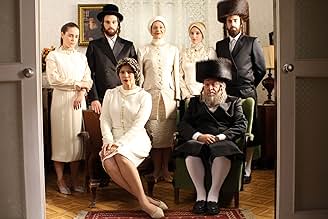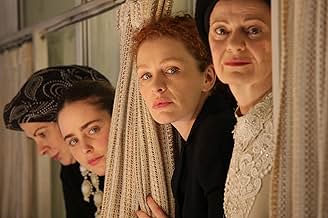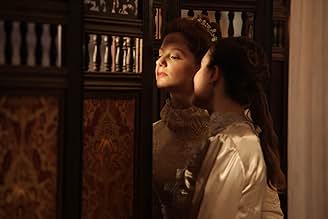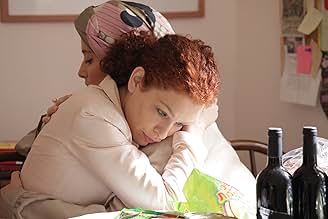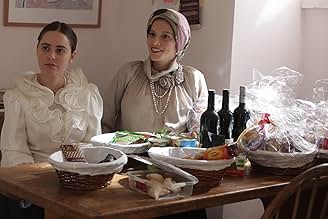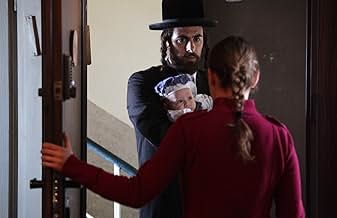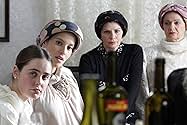NOTE IMDb
6,7/10
4 k
MA NOTE
Ajouter une intrigue dans votre langueWhen the older sister of Shira, an 18-year-old Hasidic Israeli, dies suddenly in childbirth, Shira must decide if she can and should marry her widowed brother-in-law, which also generates te... Tout lireWhen the older sister of Shira, an 18-year-old Hasidic Israeli, dies suddenly in childbirth, Shira must decide if she can and should marry her widowed brother-in-law, which also generates tensions within her extended family.When the older sister of Shira, an 18-year-old Hasidic Israeli, dies suddenly in childbirth, Shira must decide if she can and should marry her widowed brother-in-law, which also generates tensions within her extended family.
- Récompenses
- 14 victoires et 16 nominations au total
Avis à la une
10Red-125
The Israeli film Lemale et ha'halal was shown in the United States with the title "Fill the Void" (2012). It was written and directed by Rama Burshtein. Other films exist about highly observant Jews, both in Israel and the U.S. However, this movie is unusual because the director herself if part of the orthodox community. She knows how people act, what they say, how they celebrate, and how they mourn.
As in many communities where a woman's outside options are limited, marriage is a central and crucial moment in their lives. Matches are arranged, but the woman always has the right to turn down a prospective suitor. Even so, the decision about whom to marry is critically important.
The wonderful young Israeli actor Hadas Yaron plays Shira, whose time for marriage has come. A match has been made, and Shira is excited about meeting the young man and, presumably, falling in love with him. Then tragedy strikes. Shira's loving older sister dies in childbirth, leaving behind a baby boy and a widower. In order to keep the family together, it is suggested that Shira marry the baby's father. He appears to be a fine man, but he's older than she is. Also, as Shira points out, she had dreams of exploring marriage with a young man, not with a previously-married man who has a child.
It would have been easy for the director to craft a story where the whole community is pushing Shira to marry Yochay, her late sister's widower. That's not how the film was crafted. Everyone respects Shira's right to decide, and Yochay isn't desperate, either. A match has been made for him with a woman from Belgium. (The problem is that he'd have to move to Belgium to be with her, and, of course, he'd take his infant son with him.)
You'll have to see the film to find out what happens next. However, the movie is far more than just a vehicle for a plot. It's an intimate look into the lives of the ultra-orthodox, and into the heart and mind of a young woman who wants to do what is right, but also what is best.
Fill the Void won six Israeli Academy Awards, including Best Actress, Best Director, and Best Film. Hadas Yaron won the Best Actress award at the 2012 Venice Film Festival.
We saw this film at Rochester's Dryden Theatre as part of the exceptional Rochester Jewish Film Festival. I think it will work better on a large screen than on DVD, but it's worth searching for it and seeing it on a small screen if necessary. For reasons I can't understand, this movie has a lukewarm IMDb rating of 6.6. Why? It's a brilliant film and deserves to be seen. Ignore the low rating, and don't miss "Fill the Void."
As in many communities where a woman's outside options are limited, marriage is a central and crucial moment in their lives. Matches are arranged, but the woman always has the right to turn down a prospective suitor. Even so, the decision about whom to marry is critically important.
The wonderful young Israeli actor Hadas Yaron plays Shira, whose time for marriage has come. A match has been made, and Shira is excited about meeting the young man and, presumably, falling in love with him. Then tragedy strikes. Shira's loving older sister dies in childbirth, leaving behind a baby boy and a widower. In order to keep the family together, it is suggested that Shira marry the baby's father. He appears to be a fine man, but he's older than she is. Also, as Shira points out, she had dreams of exploring marriage with a young man, not with a previously-married man who has a child.
It would have been easy for the director to craft a story where the whole community is pushing Shira to marry Yochay, her late sister's widower. That's not how the film was crafted. Everyone respects Shira's right to decide, and Yochay isn't desperate, either. A match has been made for him with a woman from Belgium. (The problem is that he'd have to move to Belgium to be with her, and, of course, he'd take his infant son with him.)
You'll have to see the film to find out what happens next. However, the movie is far more than just a vehicle for a plot. It's an intimate look into the lives of the ultra-orthodox, and into the heart and mind of a young woman who wants to do what is right, but also what is best.
Fill the Void won six Israeli Academy Awards, including Best Actress, Best Director, and Best Film. Hadas Yaron won the Best Actress award at the 2012 Venice Film Festival.
We saw this film at Rochester's Dryden Theatre as part of the exceptional Rochester Jewish Film Festival. I think it will work better on a large screen than on DVD, but it's worth searching for it and seeing it on a small screen if necessary. For reasons I can't understand, this movie has a lukewarm IMDb rating of 6.6. Why? It's a brilliant film and deserves to be seen. Ignore the low rating, and don't miss "Fill the Void."
Over the last dozen or so years, no less than seven films have been made about the orthodox religious community in Israel. These films are:
Forbidden Love (1999); Kadosh (1999); Bat Kol (Inner Voice) (2002); Ushpizin (2004); My Father, My Lord (2007); The Secrets (2007); Eyes Wide Open (2009).
All these films were made by non-religious or at least non-orthodox film makers, and then along came Fill the Void. Its director and scriptwriter, Rama Burshtein, is an orthodox woman who is also a film maker.
Which raises the question whether this new film is more authentic than the previous ones, whether it portrays the orthodox community more faithfully. It should be understood that the orthodox communities in Israel are tightly-knit units, abhorring the outside, modern Western way of life which they perceive as decadent, immoral and corruptive. They still dress as did their ancestors in the Shtetl in Eastern Europe centuries ago, talk mostly Yiddish among themselves and of course, inter-marry only within their milieu.
Fill the Void is indeed about this latter issue, the question of marriage. The questions raised by the protagonists may seem quaint and even amusing to us, but seem of paramount importance to them, as if no other issues occupy their closed life.
This reviewer has no way of assessing the veracity of the facts and can only rely on subjective impressions. The film "rings true", feels true, and the fact that some of the actors come from a religious background adds to the feeling. Viewers might sneer at the seemingly irrelevant questions facing those "strange" people, but the acting convincingly conveys the sentiment that we are indeed dealing with a grave situation.
I came out of the theater thinking not about the heroine, blandly played by Hila Feldman, or about the way she handles her private demons and dilemmas, but about the strange, foreign, incomprehensible community living not a mile away from my house in the same city, yet separated from me by an unbridgeable chasm.
A disturbing movie.
Forbidden Love (1999); Kadosh (1999); Bat Kol (Inner Voice) (2002); Ushpizin (2004); My Father, My Lord (2007); The Secrets (2007); Eyes Wide Open (2009).
All these films were made by non-religious or at least non-orthodox film makers, and then along came Fill the Void. Its director and scriptwriter, Rama Burshtein, is an orthodox woman who is also a film maker.
Which raises the question whether this new film is more authentic than the previous ones, whether it portrays the orthodox community more faithfully. It should be understood that the orthodox communities in Israel are tightly-knit units, abhorring the outside, modern Western way of life which they perceive as decadent, immoral and corruptive. They still dress as did their ancestors in the Shtetl in Eastern Europe centuries ago, talk mostly Yiddish among themselves and of course, inter-marry only within their milieu.
Fill the Void is indeed about this latter issue, the question of marriage. The questions raised by the protagonists may seem quaint and even amusing to us, but seem of paramount importance to them, as if no other issues occupy their closed life.
This reviewer has no way of assessing the veracity of the facts and can only rely on subjective impressions. The film "rings true", feels true, and the fact that some of the actors come from a religious background adds to the feeling. Viewers might sneer at the seemingly irrelevant questions facing those "strange" people, but the acting convincingly conveys the sentiment that we are indeed dealing with a grave situation.
I came out of the theater thinking not about the heroine, blandly played by Hila Feldman, or about the way she handles her private demons and dilemmas, but about the strange, foreign, incomprehensible community living not a mile away from my house in the same city, yet separated from me by an unbridgeable chasm.
A disturbing movie.
One reason to view FILL THE VOID, written and directed by Rama Burshtein, is the opportunity to view the clothing, the mannerisms, the singing (endless), and the other unique characteristics of Israel's ultra-Orthodox Hasidic community. For those who have never witness this spectrum of Judaism it is an eye-opening experience: religious law, tradition and the rabbi's word are absolute. Marriages are arranged and a woman's outside options are limited, as marriage is a central and crucial moment in their lives. Matches are arranged, decisions about whom to marry are critically important, but apparently the woman always has the right to turn down a prospective suitor. Of importance to note, Rama Burshtein comes form this community and her understanding of all the permutations is obvious.
Shira (Hadas Yaron), a devout 18-year-old Israeli, has come of age and is considering marriage, having met her first serious suitor Yossi (Ido Samuel). Shira's eldest sister Esther (Renana Raz) suddenly dies in childbirth leaving her grieving husband Yochay (the very handsome and talented Yiftach Klein) with a son and no mother to care for the infant. Despite his grief (and the grief of Shira's parents - Irit Sheleg and Chayim Sharir) Yochay decides he must marry. Shira's other sister Frieda (Hila Feldman) declares that Esther had informed her that should anything happen to Esther, Frieda should marry Yochay. Shira's mother, afraid that Yochay will take the offer from a Belgium woman to marry and thus move away with her grandson from Tel Aviv, encourages Shira to marry Yochay. Shira is conflicted, gains support from her armless unmarried aunt Hanna (Razia Israeli) who knows that in this community a woman MUST be married, and after much discussion among the Rabbi (Melech Thal) and the family and Yochay and Shira, a conversation between the couple seals their fate.
The acting is excellent, the cinematography often times seems flooded with light and slightly out of focus as if taken through layers of wedding veils (!), the costumes are amazing even they are the usual dress mode of this Hassidic community, and the attention to detail of such moments as Purim and Shabbat are immaculate. The seemingly endless amount of singing by the men does grow a bit wearisome and covers dialogue at times, but this is a fresh and fascinating view of love, traditions, and laws and the still viable personal choices in this colorful community. In Hebrew with English subtitles.
Grady Harp
Shira (Hadas Yaron), a devout 18-year-old Israeli, has come of age and is considering marriage, having met her first serious suitor Yossi (Ido Samuel). Shira's eldest sister Esther (Renana Raz) suddenly dies in childbirth leaving her grieving husband Yochay (the very handsome and talented Yiftach Klein) with a son and no mother to care for the infant. Despite his grief (and the grief of Shira's parents - Irit Sheleg and Chayim Sharir) Yochay decides he must marry. Shira's other sister Frieda (Hila Feldman) declares that Esther had informed her that should anything happen to Esther, Frieda should marry Yochay. Shira's mother, afraid that Yochay will take the offer from a Belgium woman to marry and thus move away with her grandson from Tel Aviv, encourages Shira to marry Yochay. Shira is conflicted, gains support from her armless unmarried aunt Hanna (Razia Israeli) who knows that in this community a woman MUST be married, and after much discussion among the Rabbi (Melech Thal) and the family and Yochay and Shira, a conversation between the couple seals their fate.
The acting is excellent, the cinematography often times seems flooded with light and slightly out of focus as if taken through layers of wedding veils (!), the costumes are amazing even they are the usual dress mode of this Hassidic community, and the attention to detail of such moments as Purim and Shabbat are immaculate. The seemingly endless amount of singing by the men does grow a bit wearisome and covers dialogue at times, but this is a fresh and fascinating view of love, traditions, and laws and the still viable personal choices in this colorful community. In Hebrew with English subtitles.
Grady Harp
Israeli director Rama Burshtein's powerfully moving Fill the Void, Israel's submission to the 2012 Oscars, is about love and marriage but, in the Orthodox Hasidic community in Tel Aviv, they do not necessarily go together like a horse and carriage. Hadas Yaron, winner of the Best Actress Award at the Venice Film Festival in her first film role, is eighteen year-old Shira who is very close to being matched and promised to a local young man. When her older sister Esther (Renana Raz) dies in childbirth, however, her husband, the striking-looking Yochay (Yiftak Klein), is left to raise his young son Mordecai by himself and, according to tradition, has a duty to remarry once the formal mourning period is over.
This is where the film's central dilemma comes in and Shira's choice to "do the right thing" is severely tested by conflicting loyalties. After her family celebrates the Jewish holiday Purim, Shira and her mother, Rivka (Irit Sheleg) in a scene with Woody Allen overtones, are sent by the matchmaker to "shop" in the supermarket to find a suitable husband. When the right man is found, arrangements are made, even though Shira does not actually meet the young man until later in the film. When her mother learns that Yochay has a marriage offer from a widow living in Belgium, however, and cannot face the idea of the baby being taken away, she asks the matchmaker Mr. Shtreicher (Michael David Weigl) to arrange for Shira to marry Yochai, who is ten years older.
Fill the Void is a heartfelt and intimate look inside a world few of us ever have contact with. Sensitive to the orthodox community's rituals and traditions, however anachronistic they may seem to us, there is a feeling behind the rituals that binds people together and produces a feeling of closeness in the community, underscored by the rhythmic chants and joyous celebrations of special occasions. Though the purpose of every girl is to be married may seem offensive, in the culture in which it takes place, it is not demeaning, and the film does not stand in judgment of its characters or of the community.
As director Rama Buhrstein, a member of the Orthodox community herself, describes the film, "It's not about being an anthropologist or about religion or secularism. Rather, it's about the heart." Shira is asked to choose between her sense of duty to her family and community and her desire to fulfill her own dreams. Throughout the process, however, she is not alone and is always surrounded by love and support from mothers, fathers, aunts, rabbis, even though their advice may be conflicting. Her affectionate Aunt Hanna (Razia Israeli), who never married because of a disability, encourages Shira to do what is right for herself, putting her at odds with her mother.
Shira's older unwed cousin Frieda (Hila Feldman) tells her that it was Esther's wish that she marry Yochay if anything should happen to her, a proposition Yochay rebels at. Sensing Shira's confusion and uncertainty about marrying Yochay, however, the chief Rabbi (Melech Thal) refuses to bless the marriage. Even as many emotions seem to be happening all at the same time, the resolution of the conflict is poignant and even beautiful and it all comes together in a memorable final shot.
This is where the film's central dilemma comes in and Shira's choice to "do the right thing" is severely tested by conflicting loyalties. After her family celebrates the Jewish holiday Purim, Shira and her mother, Rivka (Irit Sheleg) in a scene with Woody Allen overtones, are sent by the matchmaker to "shop" in the supermarket to find a suitable husband. When the right man is found, arrangements are made, even though Shira does not actually meet the young man until later in the film. When her mother learns that Yochay has a marriage offer from a widow living in Belgium, however, and cannot face the idea of the baby being taken away, she asks the matchmaker Mr. Shtreicher (Michael David Weigl) to arrange for Shira to marry Yochai, who is ten years older.
Fill the Void is a heartfelt and intimate look inside a world few of us ever have contact with. Sensitive to the orthodox community's rituals and traditions, however anachronistic they may seem to us, there is a feeling behind the rituals that binds people together and produces a feeling of closeness in the community, underscored by the rhythmic chants and joyous celebrations of special occasions. Though the purpose of every girl is to be married may seem offensive, in the culture in which it takes place, it is not demeaning, and the film does not stand in judgment of its characters or of the community.
As director Rama Buhrstein, a member of the Orthodox community herself, describes the film, "It's not about being an anthropologist or about religion or secularism. Rather, it's about the heart." Shira is asked to choose between her sense of duty to her family and community and her desire to fulfill her own dreams. Throughout the process, however, she is not alone and is always surrounded by love and support from mothers, fathers, aunts, rabbis, even though their advice may be conflicting. Her affectionate Aunt Hanna (Razia Israeli), who never married because of a disability, encourages Shira to do what is right for herself, putting her at odds with her mother.
Shira's older unwed cousin Frieda (Hila Feldman) tells her that it was Esther's wish that she marry Yochay if anything should happen to her, a proposition Yochay rebels at. Sensing Shira's confusion and uncertainty about marrying Yochay, however, the chief Rabbi (Melech Thal) refuses to bless the marriage. Even as many emotions seem to be happening all at the same time, the resolution of the conflict is poignant and even beautiful and it all comes together in a memorable final shot.
10clg238
This is a gorgeous film. The cinematography, largely revealing closeups of the characters, is stunning, bringing us close in to an unfamiliar world, an insular, deeply religious culture. The acting is flawless. But what brings me to give this film a top rating is the story, one of moral complexity--life, after all, is complicated, a truism that Hollywood films fail miserably in addressing, the rare times they attempt to do so (perhaps "The Master" and "Doubt" are exceptions). A young, innocent woman desires to make a marriage match that is in accordance with her Jewish Orthodox tradition and yet in some ineffable way is personally to her taste. At first this seems possible, but unforeseen circumstances make her choice of marriage partner difficult. She is not just choosing for herself and potential partner but her choice is central to the happiness or unhappiness of relatives and friends—a situation of which she is acutely aware. How can she make the right choice for everyone, herself included? In a culture seeped in moral values, the moral answer to her dilemma is not an easy one. It has been a long time since I've been so deeply moved by a film.
Le saviez-vous
- AnecdotesHadas Yaron had to lie to get out of her military duty to audition for the film.
- ConnexionsFeatured in At the Movies: Venice Film Festival 2012 (2012)
- Bandes originalesIm Eshkachech Yerushalayim
(uncredited)
Meilleurs choix
Connectez-vous pour évaluer et suivre la liste de favoris afin de recevoir des recommandations personnalisées
- How long is Fill the Void?Alimenté par Alexa
Détails
Box-office
- Montant brut aux États-Unis et au Canada
- 1 775 316 $US
- Week-end de sortie aux États-Unis et au Canada
- 59 164 $US
- 26 mai 2013
- Montant brut mondial
- 3 197 615 $US
- Durée1 heure 30 minutes
- Couleur
- Mixage
- Rapport de forme
- 2.35 : 1
Contribuer à cette page
Suggérer une modification ou ajouter du contenu manquant

Lacune principale
By what name was Le coeur a ses raisons (2012) officially released in India in English?
Répondre






